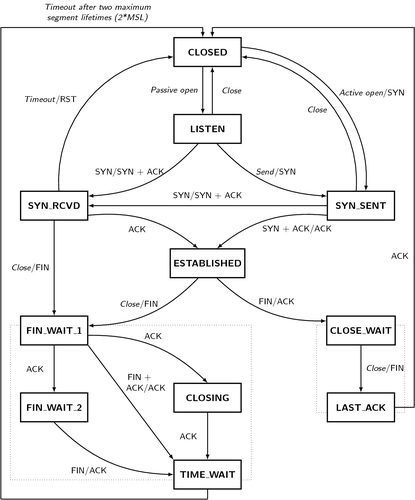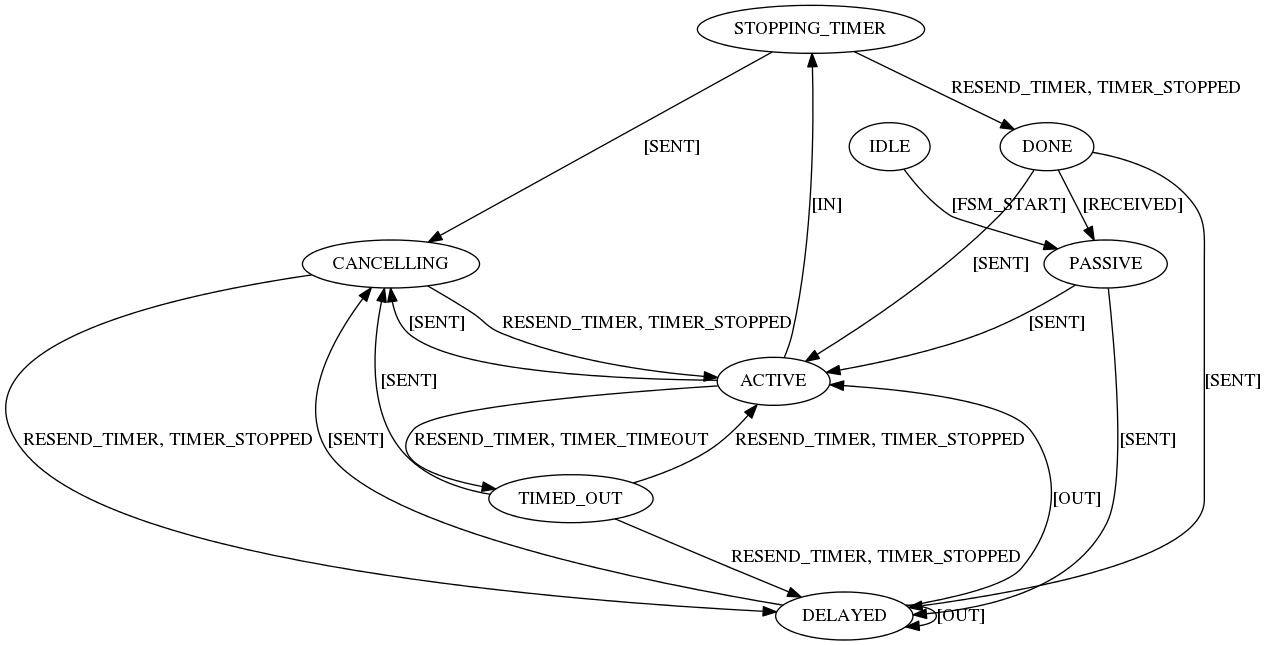I am seeing a strange behavior using ZMQ_PUB.
I have a producer which .connect()-s to different processes
that .bind() on ZMQ_SUB sockets.
The subscribers all .bind(), the publisher .connect()-s.
When a producer starts, it creates a ZMQ_PUB socket and .connect()-s it to different processes. It then immediately starts sending messages at a regular period.
As expected, if there are no connected subscribers, it drops all messages, until a subscriber starts.
The flow works normal then, when a subscriber starts, it receives the messages from that moment on.
Now, the problem is:
- I disconnect the subscriber ( stopping the process ).
- There are no active subscribers at this point, as I stopped the only one. The producer continues sending messages, which should be dropped, as there are no connected subscribers anymore…
- I restart the original subscriber, it binds, the publisher reconnects... and the subscriber receives all messages produced in the meantime !!
So what I see is that the producer enqueued all messages while the subscriber was down. As soon as the socket reconnected, because the subscriber process restarted, it sent all queued messages.
As I understood from here, a publisher should drop all sent messages when there are no connected subscribers:
ZeroMQ examples
"A publisher has no connected subscribers, then it will simply drop all messages."
Why is this happening?
By the way, I am using C++ over linux for these tests.
I tried setting a different identity on the subscriber when it binds, but it didn't work. Publisher still enqueues messages, and delivers them all when subscriber restart.
Thanks in advance,
Luis
UPDATE:
IMPORTANT UPDATE!!!!!
Before posting this question
I had tried different solutions. One was to setZMQ_LINGERto 0, which didn't work.
I addedZMQ:IMMEDIATE, and it worked, but I just found out thatZMQ:IMMEDIATEalone does not work. It requires alsoZMQ_LINGER.
Luis Rojas 3 hours ago
UPDATE: As per request, I am adding some simple test cases to show my point. One is a simple subscriber, which runs on command line and receives the uri where to bind, for instance :
$ ./sub tcp://127.0.0.1:50001
The other is a publisher, which receives a list of uris to connect to, for instance :
./pub tcp://127.0.0.1:50001 tcp://127.0.0.1:50002
The subscriber receives up to 5 messages, then closes socket and exit. We can see on wireshark the exchange of FIN/ACK, both ways, and how the socket moves to TIME_WAIT state. Then, publisher starts sending SYN, trying to reconnect (that probes the ZMQ_PUB knows that connection closed)
I am explicitely not unsubscribing the socket, just closing it. In my opinion, if the socket closed, the publisher should automatically end any subscription for that connection.
So what I see is : I start subscriber(one or more), I start publisher, which starts sending messages. Subscriber receives 5 messages and ends. In the meantime publisher continues sending messages, WITH NO CONNECTED SUBSCRIBER. I restart the subscriber, and receives immediately several messages, because they were queued at the publishers side. I think those queued messages break the Publish/Subscribe model, where messages should be delivered only to connected subscribers. If a susbcriber closes the connection, messages to that subscriber should be dropped. Even more, when subscriber restarts, it may decide to subscribe to other messages, but it will still receive those subscribed by a "previous encarnation" that was binded at same port.
My proposal is that ZMQ_PUB (on connect mode), when detecting a socket disconnection, should clear all subscriptions on that socket, until it reconnects and the NEW subscriber decides to resubscribe.
I apologize for language mistakes, but english is not my native language.
Pub's code:
#include <stdio.h>
#include <stdlib.h>
#include <libgen.h>
#include <unistd.h>
#include <string>
#include <zeromq/zmq.hpp>
int main( int argc, char *argv[] )
{
if ( argc < 2 )
{
fprintf( stderr, "Usage : %s <remoteUri1> [remoteUri2...]\n",
basename( argv[0] ) );
exit ( EXIT_FAILURE );
}
std::string pLocalUri( argv[1] );
zmq::context_t localContext( 1 );
zmq::socket_t *pSocket = new zmq::socket_t( localContext, ZMQ_PUB );
if ( NULL == pSocket )
{
fprintf( stderr, "Couldn't create socket. Aborting...\n" );
exit ( EXIT_FAILURE );
}
int i;
try
{
for ( i = 1; i < argc; i++ )
{
printf( "Connecting to [%s]\n", argv[i] );
{
pSocket->connect( argv[i] );
}
}
}
catch( ... )
{
fprintf( stderr, "Couldn't connect socket to %s. Aborting...\n", argv[i] );
exit ( EXIT_FAILURE );
}
printf( "Publisher Up and running... sending messages\n" );
fflush(NULL);
int msgCounter = 0;
do
{
try
{
char msgBuffer[1024];
sprintf( msgBuffer, "Message #%d", msgCounter++ );
zmq::message_t outTask( msgBuffer, strlen( msgBuffer ) + 1 );
printf("Sending message [%s]\n", msgBuffer );
pSocket->send ( outTask );
sleep( 1 );
}
catch( ... )
{
fprintf( stderr, "Some unknown error ocurred. Aborting...\n" );
exit ( EXIT_FAILURE );
}
}
while ( true );
exit ( EXIT_SUCCESS );
}
Sub's code
#include <stdio.h>
#include <stdlib.h>
#include <libgen.h>
#include <unistd.h>
#include <string>
#include <zeromq/zmq.hpp>
int main( int argc, char *argv[] )
{
if ( argc != 2 )
{
fprintf( stderr, "Usage : %s <localUri>\n", basename( argv[0] ) );
exit ( EXIT_FAILURE );
}
std::string pLocalUri( argv[1] );
zmq::context_t localContext( 1 );
zmq::socket_t *pSocket = new zmq::socket_t( localContext, ZMQ_SUB );
if ( NULL == pSocket )
{
fprintf( stderr, "Couldn't create socket. Aborting...\n" );
exit ( EXIT_FAILURE );
}
try
{
pSocket->setsockopt( ZMQ_SUBSCRIBE, "", 0 );
pSocket->bind( pLocalUri.c_str() );
}
catch( ... )
{
fprintf( stderr, "Couldn't bind socket. Aborting...\n" );
exit ( EXIT_FAILURE );
}
int msgCounter = 0;
printf( "Subscriber Up and running... waiting for messages\n" );
fflush( NULL );
do
{
try
{
zmq::message_t inTask;
pSocket->recv ( &inTask );
printf( "Message received : [%s]\n", inTask.data() );
fflush( NULL );
msgCounter++;
}
catch( ... )
{
fprintf( stderr, "Some unknown error ocurred. Aborting...\n" );
exit ( EXIT_FAILURE );
}
}
while ( msgCounter < 5 );
// pSocket->setsockopt( ZMQ_UNSUBSCRIBE, "", 0 ); NOT UNSUBSCRIBING
pSocket->close();
exit ( EXIT_SUCCESS );
}


